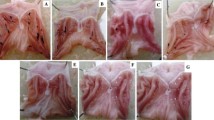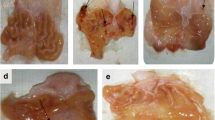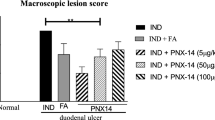Abstract
The use of nonsteroidal anti-inflammatory drugs (NSAIDs) can be associated with severe adverse digestive effects. In clinical settings, proton pump inhibitors have proven to be effective in preventing and healing NSAID-induced gastroduodenal lesions. The present study investigates the mechanisms of protection afforded by pantoprazole against gastric injury induced by different NSAIDs in rats. Animals were orally treated with indomethacin (100 μmol/kg), diclofenac (60 μmol/kg), piroxicam (150 μmol/kg) or ketoprofen (150 μmol/kg). Thirty minutes before NSAIDs, animals received pantoprazole 6 or 60 μmol/kg orally. Four hours after NSAIDs, the following parameters were assessed: histomorphometric evaluation of gastric mucosal damage; gastric mucosal levels of myeloperoxidase (MPO), malondialdehyde (MDA), reduced glutathione as an index of non-proteic sulfhydryl compounds (GSH), and prostaglandin E2 (PGE2); mucosal cyclooxygenase-1 and -2 (COX-1, COX-2) mRNA expression by reverse transcription-polymerase chain reaction (RT-PCR). Separate experiments were carried out to assay the effects of pantoprazole on gastric acid secretion in pylorus-ligated rats. The in vitro influence of pantoprazole (1–10 μM) on the oxidation of low density lipoproteins (LDLs) induced by copper sulphate was also examined. All NSAIDs elicited mucosal necrotic lesions associated with neutrophil infiltration and reduction of PGE2 levels. Increments of MPO and MDA contents, as well as a decrease in GSH levels, were detected in the gastric mucosa of indomethacin-, piroxicam- or ketoprofen-treated animals. Indomethacin enhanced mucosal COX-2 expression, while not affecting COX-1. At the oral dose of 6 μmol/kg pantoprazole did not affect NSAID-induced mucosal damage, whereas at 60 μmol/kg it markedly reduced injuries provoked by all test NSAIDs. Pantoprazole 60 μmol/kg also reversed the effects of NSAIDs on MPO, MDA, and GSH mucosal contents, without interfering with the decrease in PGE2 levels or indomethacin-induced COX-2 expression. However, at both doses, pantoprazole inhibited acid secretion in pylorus-ligated rats. Furthermore, pantoprazole concentration dependently reduced the in vitro oxidation of LDLs. Our results suggest that besides inhibiting acid secretion, the protection afforded by pantoprazole against NSAID-induced gastric damage depends on a reduction in mucosal oxidative injury, which may also account for an increment of sulfhydryl radical mucosal bioavailability. It is also suggested that pantoprazole does not influence the down-regulation of gastric prostaglandin production associated with NSAID treatment.





Similar content being viewed by others
References
Agastya G, West BC, Callahan JM (2000) Omeprazole inhibits phagocytosis and acidification of phagolysosomes of normal human neutrophils in vitro. Immunopharmacol Immunotoxicol 22:357–372
Anthony A, Sim R, Dhillon AP, Pounder RE, Wakefield AJ (1996) Gastric mucosal contraction and vascular injury induced by indomethacin precede neutrophil infiltration in the rat. Gut 39:363–368
Avila JR, De la Lastra CA, Martin MJ, Motilva V, Luque I, Delgado I, Esteban J, Herrerias J (1996) Role of endogenous sulphydryls and neutrophil infiltration in the pathogenesis of gastric mucosal injury induced by piroxicam in rats. Inflamm Res 45:83–88
Bianchi Porro G, Lazzaroni M, Imbesi V, Montrone F, Santagada T (2000) Efficacy of pantoprazole in the prevention of peptic ulcers induced by non-steroidal anti-inflammatory drugs: a prospective, placebo-controlled, double-blind, parallel-group study. Dig Liver Dis 32:201–208
Biswas K, Bandyopadhyay U, Chattopadhyay I, Varadaraj A, Ali E, Banerjee RK (2003) A novel antioxidant and antiapoptotic role of omeprazole to block gastric ulcer through scavenging of hydroxyl radical. J Biol Chem 278:10993–11001
Blandizzi C, Gherardi G, Marveggio C, Natale G, Carignani D, Del Tacca M (1995) Mechanisms of protection by omeprazole against experimental gastric mucosal damage in rats. Digestion 56:220–229
Blandizzi C, Natale G, Gherardi G, Lazzeri G, Marveggio C, Colucci R, Carignani D, Del Tacca M (2000) Gastroprotective effects of pantoprazole against experimental mucosal damage. Fundam Clin Pharmacol 14:89–99
Carvajal A, Arias LH, Vega E, Sanchez JA, Rodriguez IM, Ortega PG, del Pozo JG (2004) Gastroprotection during the administration of non-steroidal anti-inflammatory drugs. A drug utilization study. Eur J Clin Pharmacol 60:439–444
Cominacini L, Garbin U, Davoli A, Micciolo R, Bosello O, Gaviraghi G, Scuro LA, Pastorino AM (1991) A simple test for predisposition to LDL oxidation based on the fluorescence development during copper-catalyzed oxidative modification. J Lipid Res 32:349–358
Dajani EZ, Klamut MJ (2000) Novel therapeutic approaches to gastric and duodenal ulcers: an update. Expert Opin Investig Drugs 9:1537–1544
De la Lastra CA, Nieto A, Martin MJ, Cabre F, Herrerias JM, Motilva V (2002) Gastric toxicity of racemic ketoprofen and its enatiomers in rat: oxygen radical generation and COX expression. Inflamm Res 51:51–57
Esterbauer H, Striegl G, Puhl H, Dieber Rothneder M (1989) Continuous monitoring of in vitro oxidation of human low density lipoprotein. Free Radic Res Commun 6:67–75
Ferraz JG, Sharkey KA, Reuter BK, Asfaha S, Tigley AW, Brown ML, McKnight W, Wallace JL (1997) Induction of cyclooxygenase 1 and 2 in the rat stomach during endotoxemia: role in resistance to damage. Gastroenterology 113:195–204
Fiorucci S, Antonelli E, Morelli O, Morelli A (1999) Pathogenesis of non-steroidal antiinflammatory drug gastropathy. Ital J Gastroenterol Hepatol 31(Suppl 1):S6–S13
Fukuda T, Arakawa T, Shimizu Y, Ohtani K, Higuchi K, Kobayashi K (1995) Effects of lansoprazole on ethanol-induced injury and PG synthetic activity in rat gastric mucosa. J Clin Gastroenterol 20(Suppl 2):S5–S7
Hawkey CJ (2000) Nonsteroidal anti-inflammatory drug gastropathy. Gastroenterology 119:521–535
Hayes JD, McLellan LI (1999) Glutathione and glutathione-dependent enzymes represent a coordinately regulated defence against oxidative stress. Free Radic Res 31:273–300
Hiraishi H, Shimada T, Terano A (2000) Involvement of oxidative stress in the pathogenesis of NSAID-induced gastric mucosal damage. J Gastroenterol 35:567–569
Højgaard L, Mertz Nielsen A, Rune SJ (1996) Peptic ulcer pathophysiology: acid, bicarbonate, and mucosal function. Scand J Gastroenterol 31(Suppl 216):10–15
Janssen M, Dijkmans BAC, Vandenbroucke JP, Biemond I, Lamers CB (1994) Achlorhydria does not protect against benign upper gastrointestinal ulcers during NSAID use. Dig Dis Sci 39:362–365
Kwicien S, Brzozowski T, Konturek SJ (2002) Effects of reactive oxygen species action on gastric mucosa in various models of mucosal injury. J Physiol (Paris) 53:39–50
Lapenna D, De Gioia S, Cofani G, Festi D, Cuccurullo F (1996) Antioxidant properties of omeprazole. FEBS Lett 382:189–192
Lee M, Kallal SM, Feldman M (1996) Omeprazole prevents indomethacin-induced gastric ulcers in rabbits. Aliment Pharmacol Ther 10:571–576
Lehmann F, Hildebrand P, Beglinger C (2003) New molecular targets for treatment of peptic ulcer disease. Drugs 63:1785–1797
Lichtenstein DR, Syngal S, Wolfe MM (1995) Nonsteroidal antiinflammatory drugs and the gastrointestinal tract: the double-edged sword. Arthritis Rheum 38:5–18
Loguercio C, Di Pierro M (1999) The role of glutathione in the gastrointestinal tract: a review. Ital J Gastroenterol Hepatol 31:401–407
Manjari V, Das UN (1998) Oxidant stress, anti-oxidants, nitric oxide and essential fatty acids in peptic ulcer disease. Prostaglandins Leukot Essent Fat Acids 59:401–406
Natale G, Lazzeri G, Blandizzi G, Gherardi G, Lenzi P, Pellegrini A, Del Tacca M (2001) Seriate histomorphometry of whole rat stomach: an accurate and reliable method for quantitative analysis of mucosal damage. Toxicol Appl Pharmacol 174:17–26
Natale G, Lazzeri G, Lubrano V, Colucci R, Vassalle C, Fornai M, Blandizzi C, Del Tacca M (2004) Mechanisms of gastroprotection by lansoprazole pretreatment against experimentally induced injury in rats: role of mucosal oxidative damage and sulfhydryl compounds. Toxicol Appl Pharmacol 195:62–72
Ota S, Takahashi M, Yoshiura K, Hata Y, Kawabe T, Terano A, Omata M (1993) Antiulcer drugs and gastric prostaglandin E2: an in vitro study. J Clin Gastroenterol 17(Suppl 1):S15–S21
Pacheco I, Michiro O, Jin M, Sasahara H, Iwabuchi A, Odashima M, Konishi N, Wada I, Masamune O, Watanabe S (2000) Corticosteroid pretreatment prevents small intestinal lesions induced by acetic acid-perfusion model in rats. Dig Dis Sci 45:2337–2346
Peskar BM, Maricic N (1998) Role of prostaglandins in gastroprotection. Dig Dis Sci 43(Suppl 9):23S–29S
Richardson P, Hawkey CJ, Stack WA (1998) Proton pump inhibitors. Pharmacology and rationale for use in gastrointestinal disorders. Drugs 56:307–335
Savoye G, Miralles-Barrachina O, Dechelotte P, Belmonte-Zalar L, Brung-Lefebvre M, Zalar A, Hochain P, Herve S, Colin R, Lerebours E, Ducrotte P (2001) Low levels of gastric mucosal glutathione during upper gastric bleeding associated with the use of nonsteroidal anti-inflammatory drugs. Eur J Gastroenterol Hepatol 13:1309–1313
Scarpignato C, Pelosini I (1999) Prevention and treatment of non-steroidal anti-inflammatory drug-induced gastro-duodenal damage: rationale for the use of antisecretory compounds. Ital J Gastroenterol Hepatol 31(Suppl 1):S63–S72
Simmons DL, Botting RM, Hla T (2004) Cyclooxygenase isoenzymes: the biology of prostaglandin synthesis and inhibition. Pharmacol Rev 56:387–437
Somasundram S, Sigthorsson G, Simpson RJ, Watts J, Jacob M, Tavares IA, Rafi S, Roseth A, Foster R, Price AB, Wrigglesworth JM, Bjarnason I (2000) Uncoupling of intestinal mitochondrial oxidating phosphorylation and inhibition of cyclooxygenase are required for the development of NSAID-enteropathy in the rat. Aliment Pharmacol Ther 14:639–650
Stupnicki T, Dietrich K, Gonzales-Carro P, Straszak A, Terjung A, Thomas KB, Luhmann R, Fischer R (2003) Efficacy and tolerability of pantoprazole compared with misoprostol for the prevention of NSAID-related gastrointestinal lesions and symptoms in rheumatic patients. Digestion 68:198–208
Suzuki M, Nakamura M, Mori M, Miura S, Tsuchiya M, Ishii H (1995) Lansoprazole inhibits oxygen-derived free radical production from neutrophils activated by Helicobacter pylori. J Clin Gastroenterol 20(Suppl 2):S93–S96
Suzuki M, Mori M, Miura S, Suematsu M, Fukumura D, Kimura H, Ishii H (1996) Omeprazole attenuates oxygen-derived free radical production from human neutrophils. Free Radic Biol Med 21:727–731
Szabo S (1991) Mechanisms of gastric mucosal injury and protection. J Clin Gastroenterol 13(Suppl 2):S21–S34
Takeuchi K, Mizoguchi H, Araki H, Komoike Y, Suzuki K (2001) Lack of gastric toxicity of nitric oxide-releasing indomethacin, NCX-530, in experimental animals. Dig Dis Sci 46:1805–1818
Tanaka A, Hase S, Miyazawa T, Takeuchi K (2002) Up-regulation of cyclooxygenase-2 by inhibition of cyclooxygenase-1: a key to nonsteroidal anti-inflammatory drug-induced intestinal damage. J Pharmacol Exp Ther 300:754–761
Tashima K, Fujita A, Takeuchi K (2000) Aggravation of ischemia/reperfusion-induced gastric lesions in streptozotocin-diabetic rats. Life Sci 67:1707–1718
Tsuji S, Sun W-H, Tsuji M, Kawai N, Kimura A, Kakiuchi Y, Yasumaru S, Komori M, Murata H, Sasaki Y, Kawano S, Hori M (2002) Lansoprazole induces mucosal protection through gastrin receptor-dependent up-regulation of cyclooxygenase-2 in rats. J Pharmacol Exp Ther 303:1301–1308
Vane JR, Botting RM (1998) Anti-inflammatory drugs and their mechanism of action. Inflamm Res 47(Suppl 2):S78–S87
Wallace JL (2001) Pathogenesis of NSAID-induced gastroduodenal mucosal injury. Best Pract Res Clin Gastroenterol 15:691–703
Wallace JL, Granger DN (1996) The cellular and molecular basis of gastric mucosal defence. FASEB J 10:731–740
Wallace JL, Reuter B, Cicala C, McKnight W, Grisham M, Cirino G (1994) A diclofenac derivative without ulcerogenic properties. Eur J Pharmacol 257:249–255
Wandall JH (1992) Effects of omeprazole on neutrophil chemotaxis, super oxide production, degranulation, and translocation of cytochrome b245. Gut 33:617–621
Whittle BJR (2003) Gastrointestinal effects of nonsteroidal anti-inflammatory drugs. Fundam Clin Pharmacol 17:301–313
Acknowledgements
The present work was supported by a Research Grant by Recordati Industria Chimica e Farmaceutica S.p.A., Milan, Italy.
Author information
Authors and Affiliations
Corresponding author
Rights and permissions
About this article
Cite this article
Fornai, M., Natale, G., Colucci, R. et al. Mechanisms of protection by pantoprazole against NSAID-induced gastric mucosal damage. Naunyn Schmied Arch Pharmacol 372, 79–87 (2005). https://doi.org/10.1007/s00210-005-1075-1
Received:
Accepted:
Published:
Issue Date:
DOI: https://doi.org/10.1007/s00210-005-1075-1




